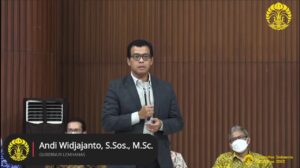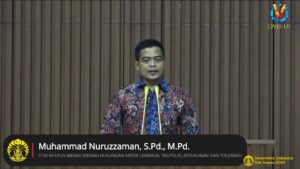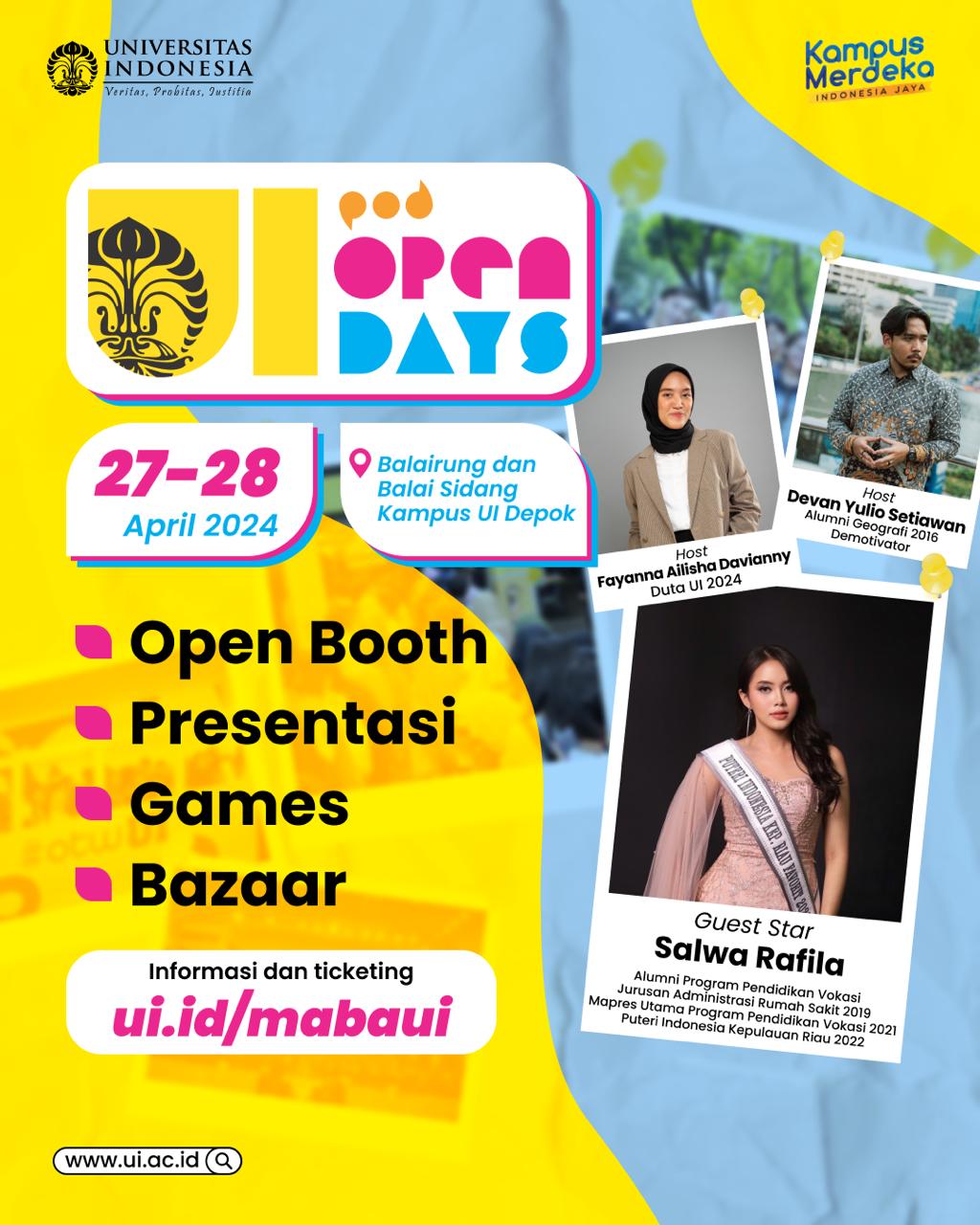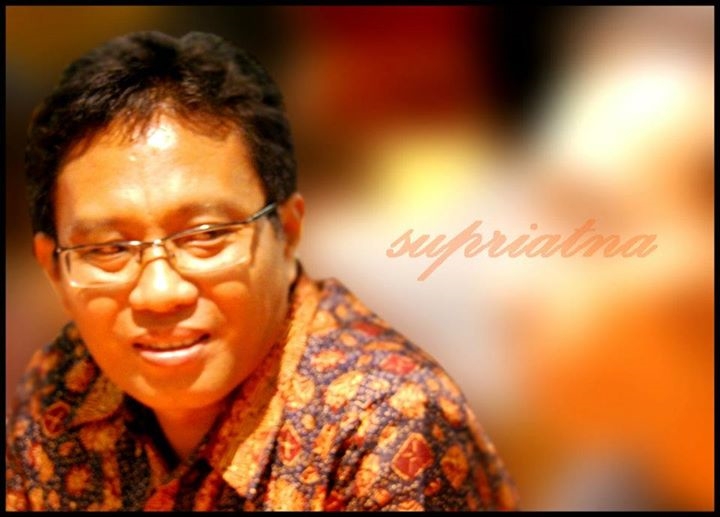
Indonesia’s plurality, which is a gift from God, must be cared for and maintained, because it has the potential to be developed as a national advantage in the eyes of the world. To provide this understanding, Universitas Indonesia (UI) invited the Indonesian Minister of Religious Affairs, the Governor of the Indonesian National Resilience Institute, and cultural activists, to share knowledge with UI freshmen in 2022 related to religious moderation, cultural diplomacy, and young generation strategies to answer contemporary challenges.
UI Rector, Prof. Ari Kuncoro, S.E., M.A., Ph.D., sees UI as a miniature of Indonesia, because UI students come from various regions in Indonesia with their respective cultures. According to Prof. Ari, building UI is building the future of the nation. Therefore, UI invited the speakers to provide an overview to students regarding the empirical facts of Indonesia’s diversity bound in a mosaic of religious harmony and moderation, as well as strategies that must be carried out by the younger generation in global geopolitical and geostrategic competition.
“UI is an inclusive, humanist, and dignified campus that was born from the womb of the Indonesian movement which is unconditionally committed to maintaining Indonesian unity and harmony. Therefore, the material presented by the speakers is an important provision for new UI students batch 2022. We believe that the diversity of racial, ethnic, cultural, and religious backgrounds is God’s decree for which we should be grateful. These differences make us learn from each other and understand each other in the process of finding one another’s equilibrium points,” said Prof. Ari in his opening remarks for the Introduction to Campus Life Program for New Students (Program Pengenalan Kehidupan Kampus bagi Mahasiswa Baru, PKKMB), Thursday (11/8), at Balairung UI.
In the context of diversity of religions and beliefs, the strategy implemented by the government to create a harmonious Indonesia is to promote religious moderation programs. Each religion has its own specificity as an area of implementation of its doctrine. However, every religion has universal values that can be used to maintain tolerance and national unity. This is because the essence of religious teachings is how each adherent has the character to be able to respect others even though they are different.

According to the Minister of Religious Affairs of the Republic of Indonesia, Yaqut Cholil Qoumas, in a speech represented by the Special Staff of the Minister of Religious Affairs for Inter-Institutional Relations, Harmony, and Tolerance, Muhammad Nuruzzaman, this nation would not exist without the moderate religious practices of Indonesia’s founding fathers. Therefore, religious moderation is the key to creating harmony, both in the family, community, and nation, even at the global level.
In the campus environment, a moderate culture needs to be built in order to realize an egalitarian, tolerant, and harmonious campus tradition. To realize this, moderate religious practices must start from the mind. Campus managers or leaders must have a moderate outlook, as well as lecturers and all education personnel. This is because they are the ones who shape students through knowledge and example. In addition, the education curriculum and syllabus must contain values of tolerance and gender justice so as to prevent the growth of extremist views that discriminate against groups.
“We need to encourage the noble values of religion as inspiration in carrying out social roles. Awareness as a citizen is important for the people of Indonesia. That awareness is how to be a good citizen by obeying the laws of the country and obeying the rules of his religion. We must realize that religion in Indonesia is not only a matter of religious practice, but also about us who do not live in an empty space,” the message from the minister of religion read.
Meanwhile, the Governor of the Indonesian National Resilience Institute, Andi Widjajanto, M.Sc., sees diversity as a strength and diversification as Indonesia’s advantage. According to Andi, a heterogen Indonesia is a big potential because it can bring up variations in innovation. Therefore, the public must familiarize themselves with the differences and explore them as a source of Indonesian excellence. In this case, Generation Y, Z, and Alpha are in charge of creating innovations to face future geopolitical challenges.
There is optimism that Indonesia will be one of the countries enjoying the demographic bonus in 2030. Indonesia’s population pyramid in that year shows the ideal conditions for a country to become a developed country. According to Andi, there are two keys for Indonesia to achieve the demographic bonus.
In addition, women’s success is also key to achieving Indonesia’s demographic bonus. This is because currently women in Indonesia account for 49.6% of Indonesia’s total population. In the 2024 elections, it is predicted that 50.8% of Indonesian voters will be women. Therefore, one of the keys to improving the quality of our demographic bonus is the productivity, competitiveness, competition, innovation of generations Y, Z, Alpha, and women.
The second key to achieving the demographic bonus is the technological leap. In innovating, the younger generation must read the needs of the community so that the innovation products produced can be useful for the community. This is done to face four scenarios that Indonesia may experience in the future, namely global connectivity and global security stability; economic transformation (green, blue and digital) and democratic consolidation; economic stagnation and democratic regression; and supply chain disruption and hegemony transition rivalry.
“This year, Indonesia’s GDP ranks fifth in Asia after China, Japan, India and South Korea. Indonesia is also in 16th position as a G20 country with the world’s top 16 economies. We hope that in the next 30 years, Indonesia will become a country that is in the top 4 in the world. As teachers, we only have one thing to be proud of, which is when we see our students being able to surpass their teachers. We are waiting for our fellow UI students through their capacities and abilities to surpass us in the future,” said Andi.
In addition to binding unity, the diversity of Indonesian culture and traditions can also be utilized as a form of art and cultural diplomacy to introduce Indonesia in the international arena. Art and cultural diplomacy is a diplomacy that utilizes aspects of art and culture to increase self-potential in order to realize the nation’s identity in the world arena. Producer, Director, and International Batik Activist, Aditya Yusma, uses art and culture, such as film and batik, as a means of diplomacy for Indonesia abroad. Through Sanggar Seni Aditya-Batikmaestro.com, Aditya and his team have introduced batik to more than 147 countries in 9 activities.

According to Aditya, batik is a guest of honor in foreign countries, but not yet a host in its own country. This is not because the commodity, sales and industry of batik are difficult to develop, but because of its regeneration. Currently, very few young people want to enter the batik industry. In fact, almost every region in Indonesia has different batik motifs. In data from the Ministry of Education and Culture, there are 6000 batik motifs in Indonesia.
“In 2009, batik was designated by UNESCO as a human heritage in oral and non-material culture or a masterpiece of the oral stage of oral and intangible heritage of humanity. With this wealth, Indonesia should be able to use batik as a diplomatic medium to introduce Indonesia to the world. We can use various means to provide socialization with educational content that contains material on cultural diplomacy. This step is then carried out with celebrations, for example through art performances, films, and batik workshops,” said Aditya.



